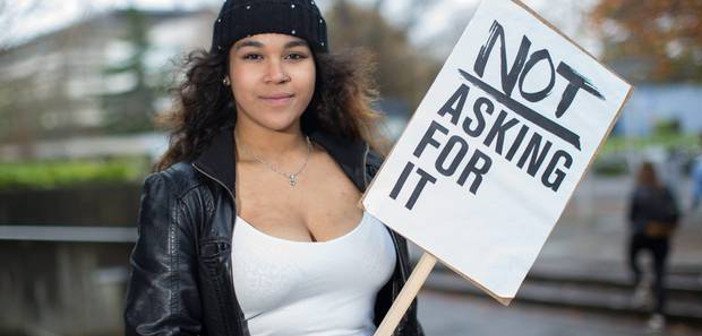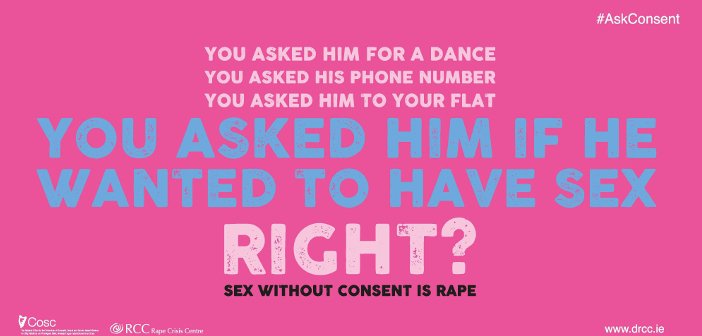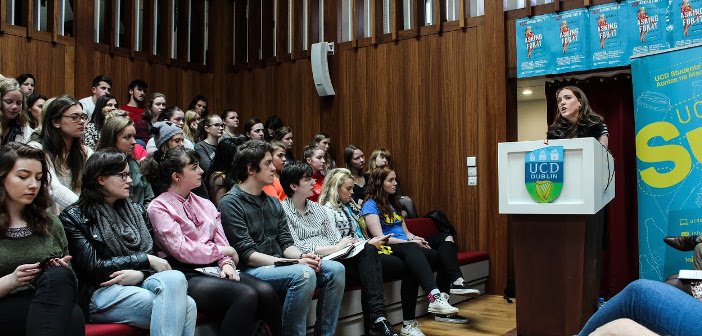Mandatory Consent Classes Aren’t Attacking Anybody, They’re Making Sure the Attacks Stop
We’ve probably all heard about #UCD200. A group of male university students allegedly engaging in revenge porn. A secret Facebook page dedicated to sharing explicit pictures of women they may have had sex with. An official inquiry into the existence of the group chat and those involved. A desperately needed discussion about consent.
All of this happened last week when UCD’s campus newspaper, the College Tribune, reported that a large group of UCD students were thought to be members of a revenge porn group chat. Brought to the attention of the publication by students using social media app YikYak, the group is apparently comprised of 200 or so male students who “shared stories about girls they had sex with, shared the girls’ nudes, and then posted the girls’ Facebook pages where they’d all rate them out of 10.”

The potential existence of the group not only led to some harsh (and warranted) criticism from UCD’s Student Union, other students, and just about anyone who recognises that posting non-consensual explicit photos of another person online is a fairly horrendous thing to do, but it also drove the university to commit to the introduction of mandatory sexual consent classes.
According to Student Union president Marcus O’Halloran, establishing such classes had already been on the agenda before the news about the Facebook chat broke. Speaking to UCD’s University Observer, he said
… It’s just a pity that this had to happen and that we hadn’t it announced. If anything, it’s made us more focused than ever to make sure it goes ahead. It’s by far the most important thing we’ll do this year.
The union also issued a statement on Facebook in which they promised to challenge the prevalence of ‘lad culture’ in the college, acquire appropriate funding to tackle all instances of sexual harassment, and ensure that the attendance of sexual consent classes would become mandatory for all students. While a vast amount of individuals who engaged with the post supported the union’s stance entirely, there were those who left comments stating that consent classes were a waste of time. They declared that consent classes were completely unnecessary, a direct ‘attack’ on men, a supposed assumption that all male students are rapists. Some people claimed that forcing someone to attend a sexual consent class was ‘ironic’ and even ‘frightening.’

There’s a reason why we should all be vociferously offended by what happened with the UCD 200, and the introduction of consent classes isn’t it. Revenge porn has been an issue among young men and women since we all figured out how to work smartphones. This common idea that ‘maybe women just shouldn’t take nudes’ not only transfers all blame to the victim, but also suggests that women should not talk about sex the same way that men do, that we should not be proud of our bodies, that we should be ashamed.[pullquote]There’s a reason why we should all be vociferously offended by what happened with the UCD 200, and the introduction of consent classes isn’t it.[/pullquote]
The prevalence of patriarchal ‘lad culture’ allows these suggestions to remain implicit in society – leading to more and more men thinking it’s okay to share non-consensual pictures online, and more and more women thinking they’re the ones who have done something wrong.
Consent classes would teach mutual respect. They would teach students what constitutes sexual harassment and rape. They would teach that no means no. And they would be for everybody. Assuming that the introduction of such classes would somehow damage the reputation of male students is illogical. Consent classes are not attacking anybody – they’re trying to make sure that the attacks stop.

A similar backlash was noted last month when Trinity announced that they too were planning to introduce sexual consent workshops to their academic programme. The Irish Times even described the university’s plans as “controversial” despite then referencing data compiled by Trinity’s Student Union revealing that 25% of their female students had been raped or sexually assaulted. A separate report issued by the USI in 2013 showed that 1 in 5 women had experienced a non-consensual sexual encounter while in college. Another survey conducted by University College Cork showed that 1 in 7 of their students had either been raped or sexually assaulted, with 82% of respondents being unsure how to report such an attack to the university.[pullquote]Deeming consent classes unnecessary is disrespectful to anyone who has ever been a victim of rape, sexual assault, or an alleged revenge porn Facebook chat. It’s also blatantly untrue.[/pullquote]
Deeming consent classes unnecessary is disrespectful to anyone who has ever been a victim of rape, sexual assault, or an alleged revenge porn Facebook chat. It’s also blatantly untrue – and those figures prove it. If consent classes helped just one person, they would still be necessary. But they won’t just help one person, they’ll help a lot of people.
They’ll benefit men, they’ll benefit women, they’ll benefit anybody who’s ever been a bit confused about what constitutes rape, anybody who’s been unsure of their place within the consent discussion until now, and anybody who’s ever considered sharing an explicit photo of somebody else without their permission.
Mandatory consent classes are not offensive. They’re not scary. They exist because sexual assault is an issue, and because rape happens. Even if we think we know absolutely everything there is to know about consensual sex, why don’t we just go anyway? We might learn something new.
